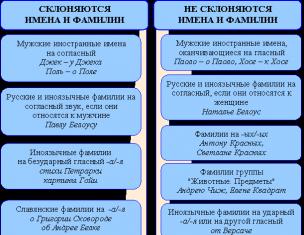The question of why literacy is needed is discussed widely and biasedly. It would seem that today, when even computer program capable of correcting not only spelling, but also the meaning; the average Russian is not required to know the countless and sometimes meaningless subtleties of their native spelling. I'm not even talking about commas that were unlucky twice. At first, in the liberal nineties, they were placed anywhere or ignored altogether, claiming that this was a copyright sign. Schoolchildren still widely use the unwritten rule: “If you don’t know what to put, put a dash.” It’s not for nothing that they call it “a sign of despair.” Then, in the stable 2000s, people began to fearfully play it safe and put commas where they were not needed at all. True, all this confusion with signs does not in any way affect the meaning of the message. Why then write correctly?
I think this is something like those necessary conventions that replace our specific canine sense of smell when sniffing. A somewhat developed interlocutor, having received an electronic message, identifies the author by a thousand little things: of course, he does not see the handwriting, unless the message did not come in a bottle, but a letter from a philologist containing spelling errors can be erased without finishing reading it.
It is known that at the end of the war, the Germans, who used Russian labor, threatened to extort a special receipt from the Slavic slaves: “So-and-so treated me wonderfully and deserves leniency.” The liberating soldiers, having occupied one of the suburbs of Berlin, read a letter proudly presented by the owner with a dozen gross mistakes, signed by a student at Moscow University. The degree of sincerity of the author became immediately obvious to them, and the average slave owner paid for his vile forethought.
Today we have almost no chance to quickly understand who is in front of us: the methods of camouflage are cunning and numerous. You can imitate intelligence, sociability, even, perhaps, intelligence. It is impossible to play only literacy - a refined form of politeness, the latter identification mark humble and mindful people who respect the laws of language as the highest form of the laws of nature.
I like to ask this question myself. Answers like “for the sake of fame” or “for the sake of money” are usually disliked. They are selfish, unspecific and are considered not very decent in communities burdened with intelligence and moral and ethical values.
In any case, the next question arises: why money or fame, to which there can be many answers. In addition, you can also do different things for the sake of money and fame, and this does not explain why you should do one and not the other.
Often, in response to a question about why he is doing something (if we are talking about something larger than going to the grocery store), he begins to tell why this matter is important and necessary, not only for him, but also for other people and for society as a whole.
However, the goals and meaning of what he was doing, usually not at all illuminated in his answer, launched his movement in this direction. And they are not even the ones who support this movement.
I believe the real overriding question is not “why,” but “why.” And the second question is “How do you explain to yourself and others why you are doing this.”
I maintain a two-layered mindset, simultaneously viewing myself as an object formed by circumstances, and feeling myself as a subject carrying out some conscious, purposeful activity.
However, understanding my conditionality and the conditionality of my actions is primary for me, and the feeling of subjective control over them is secondary.
To the “why” questions about your small actions and big things I often answer directly with two stable formulas: just because I like it (just for fun) and just because I can. Directly in English, because it was in this language that I encountered these clichés and the explanatory structures behind them.
Just Because I Like It (Just for Fun)
Just because I like it (it's fun)
In reality, it is difficult to find mice that cry but continue to eat cactus. Unless, as a result of eating a cactus, they get something that they like more than they don’t like injecting themselves. Which brings us back to the original point about why they are doing this. They just like not the painful process of eating a cactus, but its taste and feeling of satiety. “Just because I like it” is an answer that demonstrates a certain level of honesty with others and with oneself.
"Just for Fun. The Story of an Accidental Revolutionary" is the title of the book by Linus Torvalds, in which he tells how he happened to become the creator of one of the three leading operating systems - Linux, and one of the pillars of the open source software movement. As the name implies, this was, to put it mildly, not entirely the result of setting such a goal.
Erken Kagarov - the author of Cinematography, designer and inventor - also makes his observations and experiments primarily because he likes and is interested in it, and only later understands and formulates why it can be important and valuable.
Just Because I Can
Just because I can
People often do what they know how to do, what they are trained to do, what they have mastered in the course of their lives, and not at all what is really useful and rational to do in a certain situation. The space of choice that a person sees is limited by what activity he is trained to do. Journalist Masha Gessen, having gone through diagnosis and surgery due to the risk of developing breast cancer, wrote a book about it. She did this not at all because a person in such medical condition It's useful to write a book. And, it seems to me, not so much because this book was necessary and important. Yes, it informs people about little-known or actively hushed up problems and facts, helps to remove the veil of secrecy and fearful silence, and overcome stigma and discrimination. I think the main reason is that writing is what Masha Gessen knows how to do.
Stand-up comedian Tig Notaro, who experienced a breakup, the death of her mother and the discovery of breast cancer within two weeks, took it on stage and made a comedy show out of it. Again, it seems to me, first of all, simply because she knows how to do it.
I Can What I Like and I Like What I Can
I can do what I like and I like what I can do
It is reasonable to assume that very often a person knows how to do what he liked to do at one time - that’s how he learned it. There is also the opposite effect - people often begin to love what they learn to do. The underlying mechanisms are clear: we derive pleasure from a sense of competence and successful results from what we can do; and simply by doing what we like, we form this competence. Igor Kon, who has been involved in science and philosophy all his life (gender studies, pedagogy, sexology, sociology and others), at one of his public lectures, which he gave when he was already over eighty, at the end began to talk about how difficult it is now in Russia to do science, especially in his fields, what difficulties he had to overcome, how difficult the situation was in general, but, nevertheless, he continued to do it.
And at this point, explanations are expected of why his work is important and necessary, as the reason why he does it. Instead, Cohn looked at his peer and said, more to him than to the audience, something like: come on, let's be honest, we continue to do this because we like it, because this is what we do. what we can do. Almost because how else can we have fun?
Igor Kon is a standard for me scientific activity and a role model. After the lecture, I asked the questions that worried me at that time - how to make sure that my research meets the criteria scientific method how to join an existing one scientific school and traditions, so as not to do something wild and out of context, how to participate in scientific process without being institutionalized. Judging by his answers, it seemed to me then that he did not understand my problems and what I was talking about.
Now I think that he really didn’t understand, because for Igor Kon the priority was to do what was interesting to him, and not how it would be evaluated and why it was needed. Doing his job with passion and conscientiousness, he created high-quality and sought-after materials. And for sure, for example, laying the foundations of Russian sexology from scratch, Igor Kon was in a very similar position to me (except for the fact that he was by that time a recognized scientist and a powerful researcher).
* * *
I already wrote about how it happened that I began to do what I do in the text about the history of the Animopticum project. This is for me the primary layer of reasoning on this issue.I also already wrote about why I do this, what goals I set, what tasks I solve (though that was a long time ago and may not be true). And I will write more, more thoughtfully, differently and differently. I talk about this in different letters, texts, speeches, interviews, applications and projects. But for me this is only a secondary layer, a retrospective attribution of tasks and goals to the activities that I began and continue mainly for other reasons.
I do not consider it possible or meaningful for myself to unreflectively give these second-order answers without the advice of the first and the above reflections.
Conduct an experiment: try asking people the question “Why?” Surprisingly, in most cases you will hear the answer not to your question “Why?”, but to the question “Why?”:
- For what You left documentation on table?
- Because What to me need to was urgently leave.
- For what You offended?
- So after all Vasya Very rough with me talked!
- For what You said Masha, what she Always late?
- Well after all she's always true he's late!
Do you notice the difference? The question “Why?” was asked to find out what a person wanted to get as a result of his action. And, answering the question “Why?”, we were told about the events and circumstances that preceded the action, but not about the results or goals! They asked about the future, the answer they received was about the past.
Why is this happening?
Many questions like these can be difficult to answer intelligently. And this in itself is already useful. It turns out that there is no need to be angry, no need to be upset, no need to shout at each other! And there may also be a realization that the action itself, at best, does not lead to any result at all, and often simply leads to an undesirable result.
Thus, instead of useless chatter and worries, meaningful speech and actions appear.
Let's try again:
- Why did you leave the documents on the table?
- Because I needed to leave urgently.
- Not “Why?”, but “Why?”
- Oh, that's right, there's no need! They might get lost! I'll go put it in a folder.
This result seems to please us more - we are already seeing meaningful useful action, which will help avoid losing important documents.
- Why did you tell Masha that she is always late?
- Well, she really is always late!
- Yes, but he said why, so that what would happen?
- So that she knows that her lateness is noticeable to everyone!
In your performance, the question “Why?” may have different shapes: it can sound like “For what purpose?”, “For what?” (sometimes the great “So what?” sounds shorter and clearer), “What should be the result?” Ask yourself “Why am I doing this?”, “Why am I saying this?”, “Why am I feeling this?” - answer yourself - do your actions lead to the result you need? If suddenly not, then what actions lead to the desired result?
Attention: narrow-minded and conflict people can spoil even the question “Why?”, turning it into an accusation. However, for them, what “Why”, what “Why” - they don’t actually ask and don’t listen to your answers, it’s only important for them to express their dissatisfaction. We're not talking about them, right?
The question “Why?” - truly magical, check it out for yourself. It helps to switch from the reasons for an action to its result, switches thoughts from the past to the future - and, in general, increases the awareness of words, thoughts and actions.
Happy new discoveries to you!
With new, more conscious actions, thoughts and feelings!
There is a lot of talk around water: how much to drink, when to drink, what to drink and what not to drink? Life hacker found out why we need water in general and how to consume it correctly. The Eden Springs company, one of the world leaders in providing offices with water and coffee*, a manufacturer and supplier of Eden bottled water in Russia, helped answer the main questions.
Why does the body need water?
For life. On average, approximately 5 liters of blood circulate in the adult body. Blood plasma is 92–95% water. Thanks to water, blood can perform its functions:
- deliver nutrients to organ cells;
- bring oxygen to tissues from the lungs and return carbon dioxide to them;
- dispose of waste materials from internal organs through the kidneys;
- ensure homeostasis (constancy and balance internal environment): maintain temperature, water-salt balance, hormones and enzymes;
- protect the body: leukocytes and plasma proteins circulate in the blood, which are responsible for immunity.
If there is not enough water in the body, the blood mass decreases and its viscosity increases. It's not easy for the heart to pump such blood. Premature wear of the heart muscle occurs, which leads to pathology up to myocardial infarction.
That is why during active sports and high loads the body needs more water.
Is it true that lack of water causes headaches?
Is it true. Even mild dehydration causes the brain to work worse.
The brain cells are more than 80 percent water, and it is constantly washed by a fifth of all blood. Plus, the brain is “bathed” in cerebrospinal fluid, which fills all the spaces in the spinal canal and cranium.
With water, oxygen and glucose enter the brain, which are necessary for the generation of nerve impulses, that is, for nervous activity. Water removes metabolic products and toxins from the brain.
Therefore, if there is not enough fluid, dehydration (dehydration) of the brain occurs. And along with it:
- increased fatigue and absent-mindedness;
- memory impairment;
- slowing down the speed of mathematical calculations;
- negative emotions.
Dehydration has been found in people suffering from autism, Parkinson's disease and Alzheimer's disease. But schoolchildren who drink water during the school day improve their academic performance.
What happens if I don't drink enough water?
Your health will worsen. In addition to the headache, other unpleasant symptoms of dehydration from the digestive and excretory systems will appear.
The work of the stomach and intestines is impossible without the supply of water. And there are several explanations for this. Water ensures normal food digestion and absorption nutrients from the intestines. If there is not enough water in the body, discomfort in the stomach and constipation will appear.
The kidneys filter 150–170 liters of blood per day to produce 1.5 liters of urine. This means that for the normal removal of toxins and waste substances, you need to drink at least 1.5 liters of water per day, but preferably more.
With a lack of fluid, the filtration ability of the kidneys deteriorates, and they themselves can accumulate an excess of toxic substances. Against this background, various renal pathologies can occur. One of the main medical prescriptions for kidney pathology is the recommendation of drinking plenty of fluids to cleanse them and restore function.
When do you need more water than usual?
When you want to have a child. The basis of seminal fluid is water. Thanks to her, the sperm goes in search of the egg, swimming through the woman’s reproductive tract until conception occurs.
The new organism also spends all nine months in aquatic environment. The amount of amniotic fluid increases with the size of the fetus, reaching 1,000 milliliters by birth. Water supports the fetus, protects it from infections, and creates conditions for growth and development.
During childbirth, water ensures normal dilatation of the cervix and promotes the safe movement of the baby through the birth canal.
I always drink little. Will this affect me in any way?
You'll likely look worse as you get older.
Avicenna also noted that old age means dryness. In order for the skin to fulfill its protective function, it must maintain turgor (elasticity and firmness). Then she will be able to withstand the hot sun, drying wind or low temperatures air.
Healthy skin consists of 25% water and becomes wrinkled when dehydrated. This means that to maintain its turgor, daily intake of water is necessary. Better than clean, low-mineralized and without gas.
To maintain skin health, it must receive at least 2 liters of clean water per day.
What other negative consequences does water shortage cause?
Even your joints need water. If they are stiff, the person is deprived of freedom: he moves poorly and has difficulty coping with business. According to statistics, 30% of the population has joint diseases.
The joints are covered with cartilage tissue. It is the slippery elastic cartilage that ensures the mobility of bone joints. Water makes up 80% of cartilage. In addition, the articular capsule surrounding each joint contains articular fluid to lubricate the cartilaginous surfaces. With a lack of water, they collapse, causing severe pain to a person.
What should I do if I don't want to drink?
While we're busy doing things, we sometimes don't notice that we're thirsty, and we even confuse thirst and hunger, reaching for snacks when we just need a sip of water.
The best way to prevent dehydration and all of it unpleasant consequences- put a bottle or cup of clean, low-mineralized water on the table and take a sip every time your gaze falls on the water.
If you realize that you are thirsty, then eliminate your thirst in time. And if not, a sip of clean water never hurt anyone.
Both questions are good in their own way. And they deserve close attention! So.
"Why?"
The question “why” (this happened, I did this, etc.) helps to analyze the situation and draw the necessary conclusions for the future. To move on to the second question.
However, many people don't make the transition, they remain stuck in the "why". And they either continually ask this question or answer it. Answers are generated automatically, since the model is already rolled out.
Try answering the question: "Why are you late?" Easily? Still would. The alarm clock didn't go off... there was a traffic jam... mom called at the wrong time... the phone was dead...
This does not mean that all answers are lies. They may also be true. Not in this case.
The question "why?" leads to degradation.
He leads us in the same circle of the same patterns.
"For what?"
The question "why?" leads to development and self-knowledge.
The same question, asked in a different way, gives us a lot of wonderful discoveries.
"Why are you late?" Weird question. But only at first glance.
“Why did you go on vacation to this particular resort?”
"Because a cheap trip turned up"- the answer is also correct.
“Then, so as not to think, not to strain, not to be tormented by choice,”- the answer is much more interesting.
Then I learn about myself that I am lazy and passive in my choices.
And if “Because I’ve never been there”? Also good.
But better: "Because I want to see new places."
Then I learn about myself that I am inquisitive and strive for new experiences.
"Why did you quit this job?"
"Because the boss is a fool", - it is truth too.
“Then, so as not to solve problems of mutual understanding,”- better.
“Then to find a more comfortable relationship for yourself,”- better.
Then I learn about myself that a comfortable relationship with my manager is a priority for me. More priorities than salary, location of work, etc. And this is neither good nor bad. It's simply true. The truth about you.
Reactive and proactive behavior
The question "why?" and responses to it mark reactive behavior. "From" behavior.
Something happened and I react.
This is fine.
But to get stuck in this means to stop developing.
The question "why?" and responses to it mark proactive behavior. "To" or "for" behavior.
A small child picks up an object. If this object does not make sounds, what does the child do? It makes a knocking noise. With this object on any surface. The child wants to make sound. The child is proactive. He wants to be the cause of something, the creator of a phenomenon. For him there is only the question “why?”
"Why are you knocking?" - “To be loud!”
Proactive behavior, “why” behavior is more conscious.
In this case, there is a gap between the stimulus and the response. And this is a space of free choice.
In the case of "why" there is no gap. There is no free choice. I am a slave to habits, patterns, circumstances, other people...
In such people, passive constructions and their analogues dominate in their speech: “I have to”, “I am forced”, “I have no choice”, “I was called”, “I was told”... an endless number of variations.
The question "why?" requires awareness in any situation and with a projection for the future. Sometimes even very distant.
The question "why?" requires goal orientation. Every action must correspond to the goal, otherwise the question “why?” will have no answer and will turn into "why".
"Why are you doing fitness?" — “To be in excellent physical shape by the age of 50!”
Question "Why are you doing fitness?" somehow even inappropriate...
"Why are you all free time spending time on the couch?"
"Because I'm too lazy to move"- although honest, it’s wrong.
“Then, by the age of 50, turn into a wreck with excess weight and osteochondrosis, so that you have every reason to complain about your health, whine and make the lives of those around you worse,”- this is it.
Ask the question “why?” more often.
Be proactive.
Start by imagining the end result.







